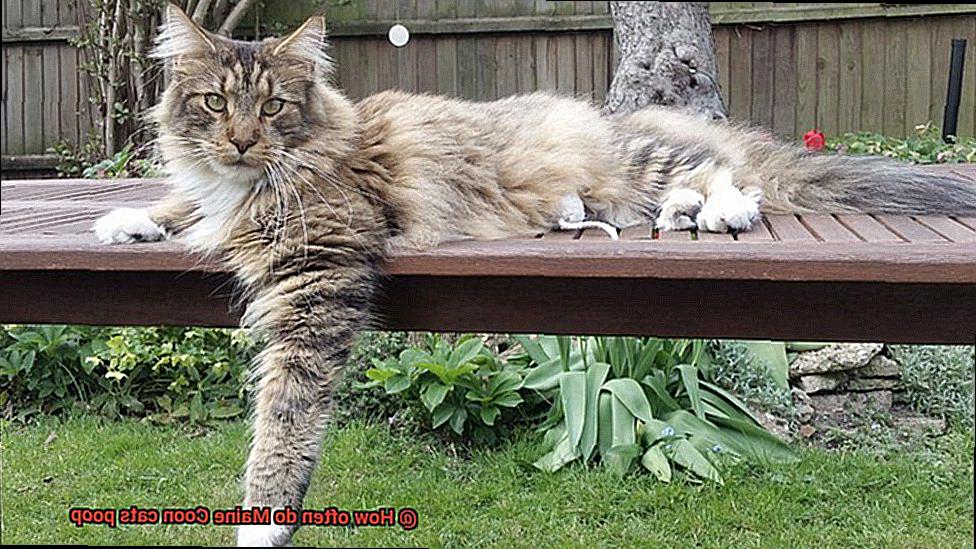Maine Coon cats are a majestic breed that never ceases to amaze their owners. With their impressive size, fluffy fur, and loving personality, they have captured the hearts of many feline enthusiasts. As pet owners, we are naturally curious about our cat’s habits, including their bathroom routine. It may sound strange, but understanding how often your Maine Coon cat poops is crucial for maintaining their health and happiness.
So, let’s get down to business – how often do Maine Coon cats poop? Well, typically, these magnificent creatures will defecate at least once a day. However, this frequency can vary depending on several factors such as diet, age, activity level and overall health.
In this blog post, we’ll explore in-depth the digestive system of Maine Coon cats and uncover what affects their bowel movements. We’ll also discuss potential issues that could cause changes in your cat’s bathroom habits and what you can do to help them.
Whether you’re a new owner or a seasoned one looking to learn more about your furry friend’s habits – this post is for you. So sit back, relax and join us on this journey of understanding how often Maine Coon cats poop.

What is a Maine Coon Cat?
These majestic felines are truly a sight to behold, with their long, flowing coats, tufted ears, and bushy tails. But their physical appearance is just the tip of the iceberg when it comes to what makes them so special.
Maine Coon cats are often referred to as the “gentle giants” of the cat world because of their friendly and sociable nature. Despite their size – they can weigh up to 20 pounds. – they are gentle and affectionate companions who love nothing more than spending time with their human family. They’re also highly adaptable to different environments, making them great indoor or outdoor pets.
But let’s not forget about their fascinating history. Maine Coon cats have been around for centuries, with origins dating back to the early colonial period in North America. While there are many myths and legends surrounding their origins (no, they weren’t crossbred with raccoons.), it’s believed that they developed from local domestic shorthair cats that interbred with long-haired cats brought over by European settlers. Over time, they evolved to adapt to the harsh New England winters and became well-suited for life on farms and in rural areas.
One of the most endearing qualities of Maine Coon cats is their intelligence and playfulness. They love interactive toys and games that challenge their minds and keep them active. Due to their size and high activity level, Maine Coon cats require regular exercise and stimulation to maintain their health and wellbeing.

So, what about their pooping habits? As with any cat, Maine Coons typically poop once or twice a day. However, it’s important to monitor your cat’s litter box habits and seek veterinary attention if you notice any concerning changes.
Overview of a Maine Coon Cat’s Pooping Habits
Maine Coon cats are known for their friendly personalities and large size, but did you know that they also have unique bathroom habits?
Typically, Maine Coon cats have regular bowel movements, usually once or twice a day. However, this can vary depending on their diet, age, and health status. It’s crucial to monitor your cat’s pooping habits to ensure that they are healthy and not experiencing any digestion issues. If you notice any changes in their poop consistency or frequency, don’t hesitate to consult with your veterinarian.
Maine Coon cats are notorious for being picky eaters, which is why it’s essential to provide them with high-quality food that meets their nutritional needs. A balanced diet can help promote consistent bowel movements and healthy digestion. Additionally, providing plenty of fresh water is also important for maintaining healthy bathroom habits.
Factors that Impact a Maine Coon Cat’s Pooping Frequency
Firstly, your cat’s diet is paramount to their digestive health. Feeding them high-quality, fiber-rich food can promote regular bowel movements. Conversely, a low-quality diet or excessive treats can lead to constipation or diarrhea, throwing off their bathroom schedule.
Age also plays a significant role in a Maine Coon cat’s pooping frequency. Young cats tend to poop more frequently than seniors because their digestive systems are still developing. Older cats may experience changes in their bathroom habits due to age-related health issues, such as arthritis or kidney disease.

Physical activity is also crucial to maintain healthy digestion and bowel movements. Regular exercise helps stimulate bowel movements and prevents constipation. Conversely, stress and anxiety can disrupt your cat’s pooping routine. Nervous or anxious cats may become constipated or experience diarrhea.

Lastly, certain medical conditions like intestinal blockages, infections, or inflammatory bowel disease can affect your cat’s pooping frequency. It’s essential to consult with your veterinarian if you notice any changes in their bathroom habits.
Signs of Abnormal Pooping Habits in Maine Coon Cats
In such cases, it’s essential to be on the lookout for signs of abnormal pooping habits in Maine Coon cats, which can indicate an underlying health condition.
One telltale sign of abnormal pooping habits in Maine Coon cats is constipation. If your cat strains to poop or has dry, hard stools, this could be a red flag for constipation. Causes may include dehydration, lack of exercise, or a diet that’s low in fiber. If your cat experiences constipation for more than two days, it’s time to take them to the vet for a thorough check-up.
Another sign to watch out for is diarrhea. If your Maine Coon cat’s poop is watery and loose, accompanied by vomiting or loss of appetite, it could be diarrhea. This condition may arise from a change in diet, infection, parasites, or other health conditions. If the diarrhea persists for over 24 hours, don’t hesitate to take your cat to the vet.
Lastly, seeing blood in your Maine Coon cat’s stool is another red flag for abnormal pooping habits. If you notice red or black flecks in their poop or stool that’s entirely bloody, this could indicate gastrointestinal bleeding. Potential causes include infections, cancer, inflammatory bowel disease (IBD), or foreign objects swallowed by your cat. In such cases, it’s essential to seek immediate veterinary attention.
How to Monitor and Maintain Healthy Bowel Movements in a Maine Coon Cat
Maine Coon cats are not only known for their size and loving personalities, but they are also susceptible to digestive issues. As a responsible pet owner, it is crucial to monitor and maintain healthy bowel movements in your Maine Coon cat to ensure their overall health and wellbeing. Here are five practical steps to help you achieve just that.
Step 1: Keep an Eye on Litter Box Habits
Your cat’s litter box habits are one of the most critical signs of their digestive health. It would be best if you observed your Maine Coon using the litter box regularly without any discomfort or difficulty. If you notice any changes in frequency or signs of distress like straining or crying out, it could indicate constipation or other digestive problems.
Step 2: Provide a Balanced and Nutritious Diet
A well-balanced, nutritious diet is vital in maintaining healthy bowel movements in your Maine Coon cat. Ensure that their diet is high in fiber and low in fat. Avoid giving them table scraps and human food that can upset their digestive system.
Step 3: Ensure Adequate Hydration
Proper hydration is crucial in promoting healthy bowel movements. Make sure your Maine Coon always has access to clean, fresh water, and consider adding wet food to their diet to increase their fluid intake.
Step 4: Encourage Regular Exercise and Playtime
Regular exercise and playtime can play a significant role in promoting healthy digestion in your Maine Coon. Encourage them to play and explore their environment by providing opportunities for them to climb, scratch, and stretch.
Step 5: Monitor Litter Box Habits and Seek Veterinary Care When Needed
Finally, monitoring your cat’s litter box habits is crucial. Seek veterinary care if you notice any concerning changes like blood or mucus in their stool, diarrhea, or constipation. Early detection and treatment of digestive issues can help prevent more serious health concerns down the line.
nbA1ZUV9py8″ >
Conclusion
In conclusion, keeping track of your Maine Coon cat’s poop schedule is crucial to their well-being and happiness. As we’ve discussed, these cats typically go at least once a day, but many factors can influence their bathroom habits. From diet and age to activity level and overall health, there’s plenty to consider.
To keep your cat feeling their best, it’s important to be mindful of what they’re eating and drinking. Encouraging exercise and playtime is also essential for maintaining healthy bowel movements. By taking these practical steps, you can help ensure that your furry friend stays regular and comfortable.
Of course, as responsible pet owners, we must also keep an eye on our cat’s litter box habits for any signs of trouble. If you notice anything unusual such as constipation or diarrhea or blood in their stool – don’t hesitate to seek veterinary attention.







